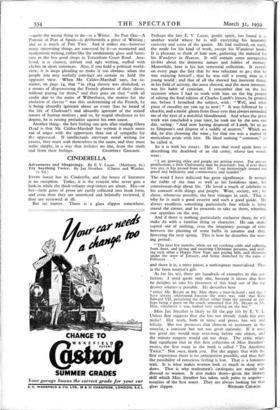CINDERELLA
' 7s. 6d.)
EVERY house has its Cinderella, and the house of literature is no exception. Today, it is the essayist who never gets a look-in while the thick-volume step-sisters are about. His—or her—little gems of prose are rarely collected into book form, and even then they are unnoticed and belatedly reviewed, if
they are reviewed at all.
But no matter. There is a glass slipper somewhere. Perhaps the late E. V. Lucas, gentle spirit, has found it another world where he is still exercising his insatiable curiosity and sense of the quaint. He had outlived, on earth, the mode for his kind of work, except his Wanderer books. It is pleasant to think of him now, gathering the material for his Wanderer in Heaven. It will contain some unexpected tit-bits about the domestic nature and foibles of eternity. Meanwhile, here is his last terrestrial collection. It reveals
on every page the fact that he was reluctant to go ; that he was enjoying himself ; that he was still a young man in a
young world ; and that of all the shrewd but innocent things in his field of activity, the most shrewd, and the most innocent.
was his habit of cynicism. I remember that on the last occasion when I had to work with him on the big project of editing the final edition of Charles Lamb's letters, he greeted me, before I broached the subject, with : " Well, and what piece of rascality are you up to now! " It was followed by a chuckle, and a moist gleam from those eyes that always reminded
me of the eyes of a watchful bloodhound. And when the great work was concluded a year later, he took me by the arm one day, saying : " And now having disposed of Lamb, let us go to Simpson's and dispose of a saddle of mutton." Which we did, he also choosing the wine ; for that too was a matter of meticulous pride with him. He liked nothing " common," as he called it.
So it is with his essays. He uses that word again here in 'describing the deathbed of an old crony, whose last words were : " I am growing older and people are getting worse. For private gratification, a little Christianity may be practised: but, if ever there was any, it has passed from real life. I see increasingly around me greed and bellicosity and commonness and scandal."
The word I have italicised has great significance. It reveals the foible of the man as well as his fastidious taste, his connoisseur-ship about life. He loved a touch of celebrity in his contacts with things and people. Wine, society, wit ; he chose, whenever possible, the best vintages in each. That is why he is such a good essayist and such a good guide. He always recollects something particularly fine which is lying round the corner, and he proceeds to take us there, whetting our appetites on the way.
And if there is nothing particularly exclusive there, he will make do with a familiar thing or character. He can make capital out of nothing, even the imaginary passage of time between the planting of some bulbs in autumn and their flowering the next spring. This is how he describes the wait- ing period :
" The next few months, while we are catching colds and suffering from them, and giving and receiving Christmas presents, and wish- ing each other a Happy New Year, and paying bills, and shivering under the snow of January, and being drenched by the rains ct February . . ."
and there it is, a mere pause, a nothingness materialised. That is the born essayist's gift.
As for his wit, there are hundreds of examples in this col- lection. I need quote only one, because it shows also how he delights to take his pleasures of this kind out of the top drawer whenever possible. He describes how
"either Mr. Bryant or Mr. May drove a four-in-hand ; and this I have always understood because the story was told that King Edward VII, perceiving the driver either from the ground or per- haps being a guest on the coach, remarked that Mr. Bryant or Mr. May, whichever it was, looked very striking on the box."
Miss Jan Struther is likely to fill the_ gap left by E. V. L. Unless that suggests that she has not already made her own niche! Her Fork, both in verse and prose, has wit and felicity. She too possesses that element so necessary in the essayist, a constant but not too great curiosity. If it were too great she would stop over-long before one object, and the minute surgery would cut too deep. The critic might find significant that in this first collection of Miss Struther',
essays, the first essay in the book is called " Try Anything Twice." Not once, mark you. For she argues that with the first experience there is no anticipation possible, and thus halt the possibility of conscious feeling is lost. That is a feminine trait. It is what makes women look so much in shop win- dows. That is why tradesmen's catalogues are mainly ad- dressed to women. It also makes them—given the literary skill which Miss Struther has taken such pains to acquire— essayists of the first water. They are always looking for that


































































 Previous page
Previous page